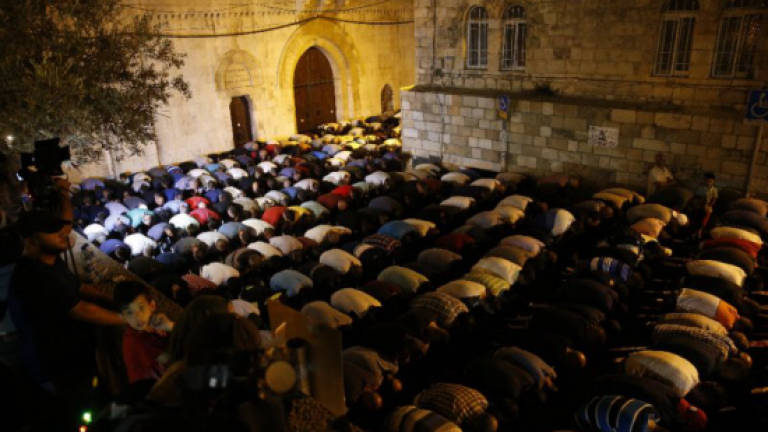Israel removes holy site metal detectors as Muslims continue boycott

JERUSALEM: Israel removed metal detectors from a highly sensitive Jerusalem holy site Tuesday after their installation triggered deadly violence, but Muslim worshippers kept up a boycott, suspicious over what would come next.
Palestinian president Mahmud Abbas said he would maintain a freeze on coordination with Israel despite the climbdown.
Israel's decision came in the face of intense international diplomacy seeking to prevent the dispute over the Haram al-Sharif mosque compound, known to Jews as the Temple Mount, from sparking wider Palestinian unrest.
The government said it would introduce more discreet measures to secure the compound housing the revered Al-Aqsa mosque and Dome of the Rock.
It installed the detectors at entrances to the site following a July 14 deadly attack nearby that killed two Israeli policemen.
Crews removed the detectors and recently installed cameras early Tuesday.
But Palestinians, who saw the new security measures as an Israeli attempt to assert further control over the site, continued their boycott.
Several hundred Muslim worshippers prayed in the surrounding streets Tuesday despite the summer heat, as they have done since the crisis began.
"What we want and what we demand is for everything to return how it was before July 14," said Mohammed Hijazi, who came from Acre in northern Israel to join the protests.
"When that happens we are ready to return to enter the Al-Aqsa mosque to pray to God Almighty."
The compound is the third-holiest site in Islam and the most sacred in Judaism.
Israel's security cabinet announced the decision to remove the detectors early Tuesday.
It will replace them with "a security inspection based on advanced technologies and other means," Prime Minister Benjamin Netanyahu's office said.
Further details were not immediately available.
The Waqf, the Islamic endowments organisation which administers the compound, said there should be "no entry" until it had assessed the site and security measures had returned to their status prior to July 14.
Abbas, who last week froze contacts with Israel including security coordination, said Tuesday that would continue "unless all measures go back to what they were before July 14".
'Protect Jerusalem'
Dozens of Israeli settlers on Tuesday seized a disputed building next to another flashpoint holy site in the occupied West Bank city of Hebron.
They raised an Israeli flag atop the building near a shrine known to Jews as the Cave of the Patriarchs and to Muslims as the Ibrahimi Mosque.
The site is a source of tension between the city's Palestinian residents and several hundred Israeli settlers who live in central Hebron under heavy military guard.
Turkish President Recep Tayyip Erdogan on Tuesday urged Muslims to visit Jerusalem to protect the holy places.
"Anyone who has the opportunity should visit Jerusalem, Al-Aqsa mosque," Erdogan said in Ankara. "Come, let's all protect Jerusalem".
An Israeli foreign ministry statement called the comments "mind-blowing, false and distorted", and suggested that Erdogan "deal with the problems in his own country".
Israel's decision to dismantle the detectors followed talks between Netanyahu and Jordan's King Abdullah II, who demanded their removal.
Jordan is the official custodian of Muslim holy sites in Jerusalem and is one of only two Arab governments to have signed a peace treaty with Israel.
It also came after one of US President Donald Trump's top aides, Jason Greenblatt, arrived in Israel for talks on the crisis.
But UN Middle East envoy Nickolay Mladenov warned Tuesday that "we are not over this crisis yet".
"I hope that the steps being taken by Israel will enable a return to relative calm, and we all hope this will happen in the next days."
Deadly weekend
Israeli authorities had argued the detectors were necessary because the July 14 attackers smuggled guns into the compound and emerged from it to shoot the officers.
Friday's main weekly Muslim prayers in Jerusalem – which typically draw thousands to Al-Aqsa – brought the dispute to a boil.
Clashes erupted between Israeli security forces and Palestinians in Jerusalem and the occupied West Bank, leaving three Palestinians dead.
Friday evening also saw a Palestinian break into a home in a Jewish settlement in the West Bank during a Sabbath dinner and stab four Israelis, killing three.
Two more Palestinians were killed in Saturday clashes.
The mosque compound is a key symbol for Palestinians.
In 2000, then Israeli opposition leader Ariel Sharon's visit there helped ignite the second Palestinian intifada, or uprising.
Jerusalem's Old City is in east Jerusalem, which Israel seized in the Six-Day War of 1967 and later annexed, a move never recognised by the international community.
A diplomatic standoff between Israel and Jordan may have helped negotiations on the metal detectors.
On Sunday night in Amman, an Israeli embassy security guard shot dead a Jordanian who attacked him with a screwdriver, Israeli officials said.
A second Jordanian was also killed, apparently by accident.
Israel had insisted the guard had diplomatic immunity and rejected Jordanian demands to question him.
But on Monday night, the guard and other diplomats arrived home after a deal that a Jordanian government source said also involved the mosque compound.
On Tuesday, thousands of Jordanians chanted "Death to Israel" at the funeral of the 17-year-old said to have attacked the guard. — AFP